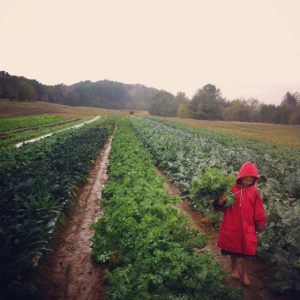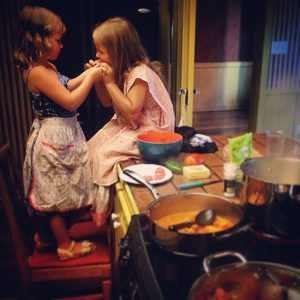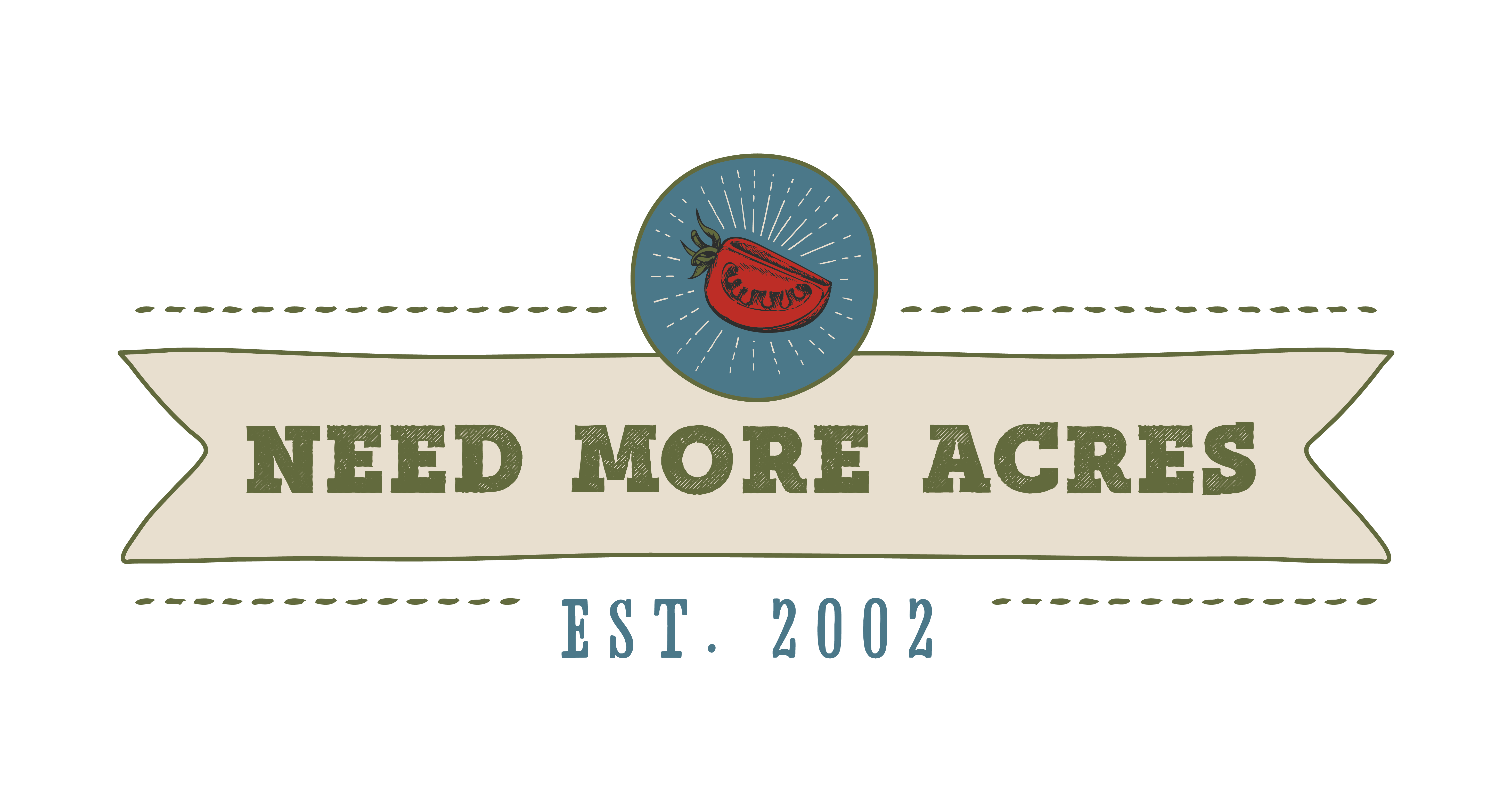
As Lisa Munniksma points out in an article for Hobby Farms titled The Farm-Family Connection recapping my presentation with co-presentor Shoshannah Inwood the wide gap of respect, value and even monetary return for the caretakers (those who cook, clean the house, care for children or elderly) compared to those who drive the tractor, plant the fields or take product to market is astonishing. The reality is that in most farm households the care taking, marketing, communicating is considered “women’s work” and given much less dignity than the heavy lifting and obviously productive work that is most often done by men. This doesn’t seem much different than how we value a caretakers role regardless of whether the household has farm income or not. It’s this divide that often leads to stress and division among couples who are often overworked and under valued. I wrote previously about how Nathan and I learned to fight the good fight on our family farm and it’s still a process for us.
As I look back to the beginning of my career assisting tobacco farmers transition to fruit and vegetable crops I have memories of sitting at the kitchen table of a farmer seeking counsel for their farm future. The husband looking at the books, the wife preparing a meal and offering me a glass of tea. Showing me photos of her kids growing up on the farm and telling me all about her neighbors, co-workers and others whom she cared deeply about in her community. As that conversation might possibly have sparked ideas for tangible ways to market fruits and vegetables more effectively the direction was redirected to profit and loss, inputs and outputs. How might things be different if we consider that women might just know the best way to sell the food they prepare and consume themselves to the people they know by name? How might we look at inputs and outputs differently if we recognize that the energy created by a good meal is what creates the manpower for labor intensive work? How might our communities be a better place if we valued the quality of care for our children and elderly rather than minimizing it to a secondary responsibility? What if fathers were allowed a desire to meet the basic needs of their children while mothers can meet their craving for more uninterrupted time in the field? Without realizing it these are questions that Nathan and I have been answering here on our own farm over the past few years, but not without difficulty and perseverance.
During my presentation I got real-very real- about how difficult it was for me to find value as a stay/work at home mom and eventually a working partner on our farm. The motives I had in working from home while caring for my children came from the voices I heard from society about the state of children’s behavior and acceptance in an “adult world”. Beyond “kids these days” comments I took very seriously how we as a society were blowing off the value, responsibility and contribution that kids can have in the home, on a farm, within the community. I wanted to raise children who were more than good-I wanted my children to be hard working, brave, compassionate, realistic. Not just for myself or even for them, but because I truly believed that allowing children back into the daily lives of adults may just be the way to invite women into roles that can provide economic stability for their family in a meaningful way. How I could transition from a career based on climbing the corporate ladder to a mom meeting basic needs while trying to engage her community was-and is-a long, difficult road to travel.
Thinking back to the observations that Elizabeth and I noticed at the conference made me contemplate how things may be different had we more women who felt liberated to speak up about their day to day life and challenges on a farm household. How might we have farms capable of meeting the increasing demands of consumers if there was less control from powerful people in positions of authority who often times didn’t understand the unique challenges farmers face. This is where my work turns slightly political as I recognize that many of the policies in place not only limit small scale farming significantly, but they also in some ways devalue women being engaged and present on the farm day after day. The need for higher economic return becomes so great that the woman often leave the farm just to make ends meet. The work can become so demanding that a woman sacrifices the integrity of her original intentions. I’ve been that woman and heard from these women enough to know that the concern is real and must be faced with seriousness.
This is where I speak up and say that through faith in who we are-and how we were designed-we as women often have the heart to speak up and change things that benefit not only our own roles on the farm, but the opportunities for beginning farmers and our children’s futures. What saddens me is that women often down play their desire to have children or raise them well in order to fit into a system that doesn’t meet the daily demands of farm life. A fear over a child being injured, not being successful as an adult or not fitting into the status quo can lead farmers to try to live in another world while barely existing in their own. On one hand we do not value the role of a woman who prepares meals for everyone working on the farm, but on the other hand we scatter to figure out how to change the poor eating habits of our country. We criticize stay/work at home moms-or even worse limit them to a very streamlined version of what they are truly capable of-while complaining about how difficult it is to creatively market, distribute and find success connecting to consumers. We feel pressure to grow, expand, win at all costs while we lose sight of the reasons we chose farming to begin with.
While I must admit that I do not have all the answers and probably never will there are a few things I’ve become more and more passionate about that may help small scale farm households succeed at all of their goals (not with income alone, but also with satisfaction of their work and home life).
-We must begin to value the roles of those who care for our basic needs in order to regain integrity, humanity. This means mothers, caregivers, teachers, farmers, food service employees, etc. are considered as valuable and important as those in positions of power. When all of those people must work hard in order for only a few to become “special” or successful then we as a society have lost more than we realize. We must guarantee that the most successful farmers in a community are not the only ones with voices that are heard as this only creates more pressure for farm families to grow beyond their means and limit their ability to continue caring for themselves in ways that matter most-emotionally, physically, spiritually. We must encourage spaces where women can gather to discuss these things.
-We must allow small scale farmers to become competitive in the food marketplace. One example is that as more and more households purchase their food somewhat processed (chopped, diced, frozen, ready to heat and eat) we must allow farmers the ability to do this on farm so that they can meet the needs of their customers successfully while caring for their families basic needs. Here is how that is being done in California.
-We must consider how we are taking care of everyone in our community-particularly how they are having their basic needs met. One way to do this is to encourage farm sales to low-income residents through programs like offering Double Dollars for supplemental nutrition program benefits (over 1.2 billion dollars are spent through the SNAP program in Kentucky each year-a small percentage of that to local food could make the difference for success on a small scale farm). This is how it is being done at Community Farmers Market.
-We must create better collaboration to expand farm sales to institutional buyers. We as a society eat a large portion of our food in schools, hospitals, prisons and other institutions where funding for that food is provided by a government entity. Over 10 billion dollars is spent on free and reduced lunch programs nationwide each year. It makes sense to be spending those dollars on fresh, healthy food while also supporting the local economy. Women farmers and front line food service employees often have the heart and also understand the barriers to success. Let’s invite them to the table and start more open conversations on ways to create better food systems. Here is more information about the Farm to School program.
A recent study coming out of the work from my co presenters at AFT pointed out that the two factors that influence farm households is 1. making a profit and 2. spending time with family. In the same survey over half say that childcare is problematic. On our farm we are working through societal norms that place a need for separation between adults and children. As I raise kids in a household that allows them to contribute to our home, work and community we are able to open our home to other families with young children who are able to take up farming, develop their own customer base, prepare food for profit and leave time for collaboration and partnerships that work towards policy change and outreach. This takes overcoming ideals and society expectations based on consumerism and achieving-it’s hard, but possible. I teach my children-three girls and a boy-to care for one another while also bringing them to observe my story telling to policy makers, government employees and community leaders. I’m teaching them that they are valuable no matter what occupation they choose for themselves and so is everyone else. Sharing meals together can be just as meaningful as a business venture that increases profit. What freedom there is in knowing we all matter and that there is room for everyone to succeed as long as we are willing to work hard, keep our faith, listen and live compassionately.


